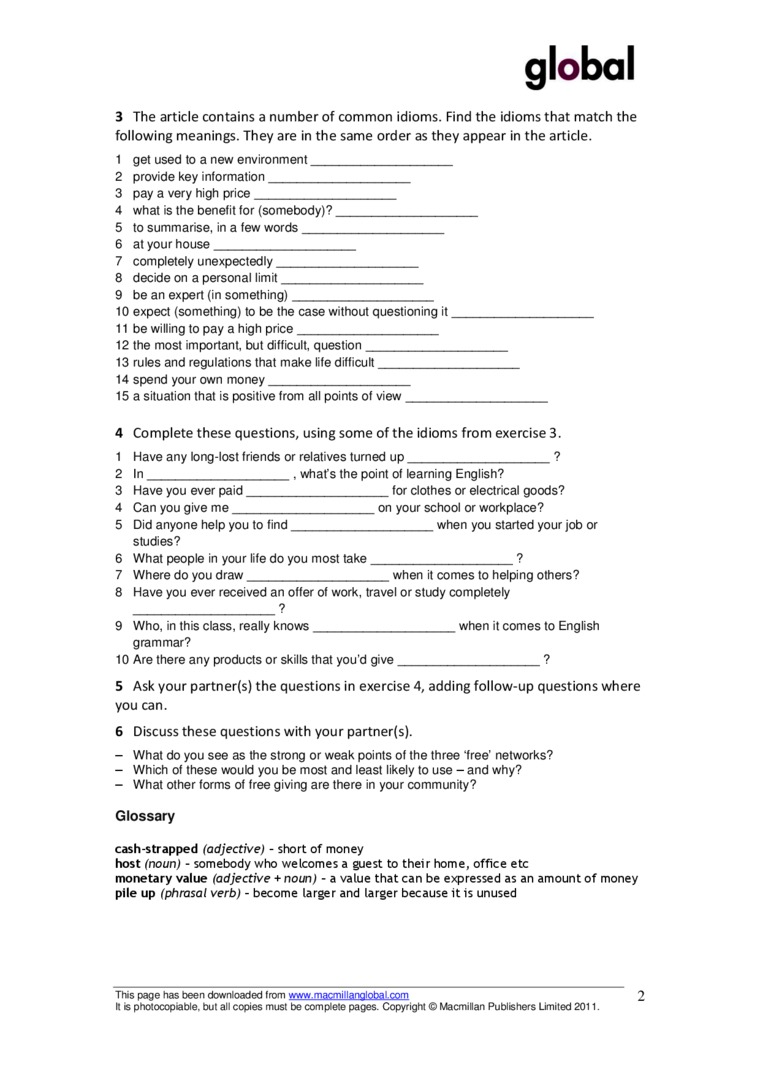46447

global
3 The article contains a number of common idioms. Find the idioms that match the following meanings. They are in the same order as they appear in the article.
1 get used to a new environment_
2 provide key information_
3 pay a very high price_
4 what is the benefit for (somebody)?_
5 to summarise, in a few words_
6 at your house_
7 completely unexpectedly_
8 decide on a personal limit_
9 be an expert (in something)_
10 expect (something) to be the case without questioning it_
11 be willing to pay a high price_
12 the most important, but difficult, question_
13 rules and regulations that make lite difficult_
14 spend your own money_
15 a situation that is positive from all points of view_
4 Complete these questions, using some of the idioms from exercise 3.
1 Have any long-lost friends or relatives turned up_?
2 In_, what’s the point of learning English?
3 Have you ever paid_for clothes or electrical goods?
4 Can you give me_on your school or workplace?
5 Did anyone help you to find_when you started your job or
studies?
6 What people in your life do you most take_?
7 Where do you draw_when it comes to helping others?
8 Have you ever received an offer of work, travel or study completely
_?
9 Who, in this class, really knows_when it comes to English
gram mar?
10 Are there any products or skills that you’d give_?
5 Ask your partner(s) the questions in exercise 4, adding follow-up questions where you can.
6 Discuss these questions with your partner(s).
- What do you see as the strong or weak points of the three ‘free’ networks?
- Which of these woukJ you be most and least likely to use - and why?
- What other forms of free giving are there in your community?
Glossary
cash-strapped (adjective) - short of money
host (rtoun) - somebody who welcomes a guest to their home, Office etc
monetary value (adjective + noun) - a value that can be expressed as an amount of money
ptle up (phrasal verb) - become larger and larger because it is unused
This page has been downloaded from www.macmilląnglobai com
It is photocopiable. but all copies must be compfete pages. Copyright © Macmillan PuWishers Limited 2011.
2
Wyszukiwarka
Podobne podstrony:
img028 (15) RecruitmentGrammar1 The text below contains a number of first conditional sentences. Put
498 Because there is no homogenous definition of risk in Insurance Theory, the first part of the art
common idioms Salt of the earth fs7.fors77.sJ. a basically good or valuable person: Eueryone here co
3 (842) In the utility room A number of products are likely to contain toxic ingredients: carpet cle
global 3 The article contains 20 phrasal verbs. They are in the same order as they appear in th
00246 !d6f6da4a401d8c9089d33a3b3c255f 248 Vander Wiel the probabilistic characteristics of run leng
00352 Y81713c432e612628e0c1a55ba8c097 356 Prairie & Zimmer Let Ed be the number of defective un
kolibry w malwach (2) Next, add the details as descnbed, using the number of strands indicated by th
ImageRotator Redraw image
% of the number of independent variablcs to be tested, only main cffccts werc initially fittcd; relc
skanowanie0107 (2) 12.4.5. Keys to teaching the writing skills A number of things
więcej podobnych podstron